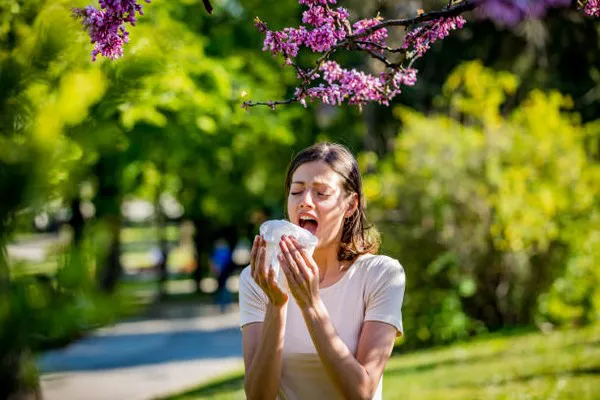Pollen allergies, also known as hay fever or seasonal allergic rhinitis, affect millions of people worldwide, particularly during spring and summer when pollen levels are high. These allergies occur when the immune system overreacts to pollen grains released by plants, trees, and grasses. The result can be a range of uncomfortable symptoms that affect the eyes, nose, throat, and sometimes the skin. This article provides a comprehensive guide on how to manage pollen allergies effectively, from avoidance strategies to medical treatments and lifestyle adjustments.
Understanding Pollen Allergies
Pollen allergies are a type of allergic reaction caused by the immune system’s response to pollen. When someone with a pollen allergy comes into contact with pollen, their body produces antibodies called immunoglobulin E (IgE). These antibodies trigger the release of histamine and other chemicals, leading to allergy symptoms.
Common Symptoms of Pollen Allergies
The symptoms of pollen allergies can vary in severity and may include:
Sneezing: Repeated, forceful sneezes are a common symptom of pollen allergies.
Runny or Stuffy Nose: Increased mucus production and nasal congestion can make breathing difficult.
Itchy or Watery Eyes: Pollen can cause the eyes to become red, itchy, and watery.
Itchy Throat or Ears: The itchiness can extend to the throat and ears, causing discomfort.
Coughing: Post-nasal drip from a stuffy nose can lead to coughing.
Skin Rashes: In some cases, pollen can cause skin irritation or hives.
Diagnosis of Pollen Allergies
Diagnosing pollen allergies typically involves a combination of medical history, physical examination, and allergy testing:
Medical History: A healthcare provider will ask about symptoms, their severity, and any patterns or triggers.
Physical Examination: A physical examination may reveal signs of allergic reactions, such as nasal congestion or eye redness.
Allergy Testing: Skin prick tests or blood tests can help identify specific allergens causing the reaction.
Management Strategies for Pollen Allergies
Managing pollen allergies involves a combination of avoidance, medication, and immunotherapy:
Avoidance: The best approach is to avoid known allergens as much as possible. This may involve keeping windows closed during high pollen seasons, using air conditioning, and wearing sunglasses when outdoors.
Medications: Over-the-counter and prescription medications can help control allergy symptoms. Antihistamines, decongestants, and corticosteroids are commonly used to relieve sneezing, itching, and inflammation.
Immunotherapy: Also known as allergy shots, immunotherapy involves receiving injections of gradually increasing amounts of allergen to build tolerance over time.
Environmental Control: Using air purifiers, dehumidifiers, and allergen-proof bedding covers can help reduce exposure to allergens in the home.
Lifestyle Modifications: Regular exercise, a balanced diet, and stress reduction techniques can help support the immune system and may reduce the severity of allergy symptoms.
Complementary Therapies for Pollen Allergies
While there is no cure for pollen allergies, some natural remedies and complementary therapies may help alleviate symptoms:
Butterbur: This herbal supplement has been shown to reduce allergy symptoms when taken regularly.
Quercetin: A natural antioxidant found in apples, onions, and berries, quercetin may help reduce histamine release.
Vitamin C: This vitamin may help strengthen the immune system and reduce the severity of allergy symptoms.
Acupuncture: Some studies suggest that acupuncture may help reduce allergy symptoms by调节 the body’s immune response.
The Role of Diet in Pollen Allergy Management
While diet alone cannot cure pollen allergies, certain dietary changes may help reduce inflammation and support the immune system:
Anti-Inflammatory Foods: Foods rich in omega-3 fatty acids, such as fatty fish, walnuts, and flaxseeds, can help reduce inflammation.
Vitamin-Rich Foods: Vitamins C and E, found in fruits and vegetables, can support the immune system and may help reduce the severity of allergy symptoms.
Hydration: Drinking plenty of water helps maintain overall health and can alleviate symptoms like a dry throat or nose.
Natural Remedies for Pollen Allergies
In addition to conventional treatments, some natural remedies may help alleviate pollen allergy symptoms:
Nasal Irrigation: Using a saline solution to rinse the nasal passages can help remove allergens and reduce congestion.
Local Honey: Some people believe that consuming local honey can help build immunity to local pollen, although scientific evidence is limited.
Herbal Supplements: Certain herbs, such as butterbur and quercetin, may help reduce allergy symptoms. Always consult with a healthcare provider before starting any new supplements.
Long-Term Management Strategies
For individuals with persistent or severe pollen allergies, long-term management strategies may include:
Allergy Immunotherapy: Allergy shots or sublingual immunotherapy can help build tolerance to specific allergens over time.
Lifestyle Modifications: Maintaining a healthy lifestyle, including regular exercise, a balanced diet, and stress management, can support overall immune function.
Regular Follow-Up: Regular check-ups with an allergist can help monitor symptoms and adjust treatment plans as needed.
Conclusion
Pollen allergies can significantly impact an individual’s quality of life, particularly during peak pollen seasons. By understanding the causes and symptoms of pollen allergies, and implementing effective management strategies, individuals can take control of their symptoms and enjoy the outdoors with less discomfort. Always consult with a healthcare professional or an allergist for personalized advice and recommendations based on your specific needs and circumstances.
Related Topics:


